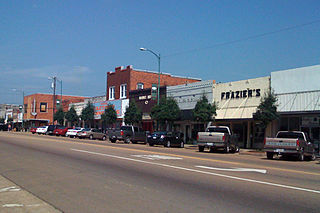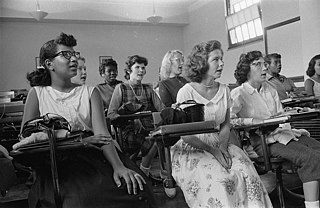Related Research Articles

Louisville is a city in Winston County, Mississippi. The population was 6,631 at the 2010 census. It is the county seat of Winston County.

Race-integration busing in the United States was the practice of assigning and transporting students to schools within or outside their local school districts in an effort to diversify the racial make-up of schools. While the 1954 U.S. Supreme Court landmark decision in Brown v. Board of Education declared racial segregation in public schools unconstitutional, many American schools continued to remain largely uni-racial due to housing inequality. In an effort to address the ongoing de facto segregation in schools, the 1971 Supreme Court decision, Swann v. Charlotte-Mecklenburg Board of Education, ruled that the federal courts could use busing as a further integration tool to achieve racial balance.

Jackson Academy is a private school in Jackson, Mississippi founded by Loyal M. Bearrs in 1959. Bearrs claimed he established the school to teach using an accelerated phonics program he developed, but the school remained completely racially segregated until 1986, even forgoing tax exemption in 1970 to avoid having to accept Black students.

Segregation academies are private schools in the Southern United States that were founded in the mid-20th century by white parents to avoid having their children attend desegregated public schools. They were founded between 1954, when the U.S. Supreme Court ruled that segregated public schools were unconstitutional, and 1976, when the court ruled similarly about private schools.

Jackson Preparatory School is an independent, coeducational, day school enrolling 700 students in grades five through twelve. The school is located in Flowood, Mississippi, a suburb of Jackson, and has a controversial history as a segregation academy.
Sharkey-Issaquena Academy is a private, nonsectarian, school in Rolling Fork, Mississippi. It was founded as a segregation academy in 1970.

The Indianola Academy is a K-12 private school in Indianola, Mississippi founded as a segregation academy. Indianola Academy comprises an elementary school, a middle school, and a college preparatory high school. Indianola Academy is a 501(c)(3) nonprofit institution. As of 2012 most white teenagers in Indianola attend Indianola Academy instead of the public high schools.
Bayou Academy is a non-profit school located in unincorporated Bolivar County, Mississippi, near the City of Cleveland on Highway 8. The school serves about 500 students in grades Pre-Kindergarten through 12. The school is accredited by the Midsouth Association of Independent Schools.

Pillow Academy (PA) is an independent, co-educational college preparatory school in unincorporated Leflore County, Mississippi, near Greenwood. It was founded by white parents in 1966 as a segregation academy to avoid having their children attend school with blacks.
Alexander v. Holmes County Board of Education, 396 U.S. 19 (1969), was a United States Supreme Court case in which the Court ordered immediate desegregation of public schools in the American South. It followed 15 years of delays to integrate by most Southern school boards after the Court's ruling in Brown v. Board of Education (1954) that segregated public schools were unconstitutional.

Gentry High School is a public secondary school in Indianola, Mississippi, part of Sunflower County. At 801 B.B. King Road, the school is part of the Sunflower County Consolidated School District and was formerly part of the Indianola School District.
Thomas Heyward Academy is a private school located in Ridgeland, South Carolina. The school, founded as a segregation academy in 1970, was named after Thomas Heyward Jr., a signer of the Declaration of Independence and Articles of Confederation who was a native of Ridgeland. The schools nickname is The Rebels.
Central Holmes Christian School (CHCS), previously Central Holmes Academy, is a private non-sectarian Christian school in Lexington, Mississippi. It includes elementary, middle, and high school grades 1-12. The school has a controversial history as a segregation academy.
Lee Academy is a grade 7–12 private school in Clarksdale, Mississippi.

School integration in the United States is the process of ending race-based segregation within American public and private schools. Racial segregation in schools existed throughout most of American history and remains an issue in contemporary education. During the Civil Rights Movement school integration became a priority, but since then de facto segregation has again become prevalent.
Winston Academy is a private college preparatory school in Louisville, Mississippi. It was founded in 1969 as a segregation academy.
The Mississippi Red Clay region was a center of education segregation. Before the Brown v. Board of Education decision in 1954, Mississippi sponsored freedom of choice policies that effectively segregated schools. After Brown, the effort was private with some help from government. Government support has dwindled in every decade since. In the state capital, Jackson, some public schools were converted to white-only Council schools. Today, some all-white and mostly-white private schools remain throughout the region as a legacy of that period.
East Holmes Academy (EHA) was a segregation academy in West, Mississippi. The school was founded in 1965 and closed in 2006. In 1989, EHA received national attention after two incidents involving alleged racial discrimination.
Canton Academy, officially known as the Canton Academic Foundation, is a segregation academy in Canton, Mississippi, the county seat of Madison County. It serves 285 students in grades K-12.
Saints Academy was a private 1-12 school in Lexington, Mississippi, the county seat of Holmes County. Founded by the Church of God in Christ in 1918 as the Saints Industrial and Literary School, a school for black children in a segregated environment, it gradually expanded. Under principal Arenia Mallory from 1926-1977, the school added grades until it provided classes through high school. It had a national reputation for its strong academics and attracted students from outside the region, including from families who had migrated north.
References
- 1 2 "Eleanor Warrick Dean retires after 37 years". Winston County Journal. June 3, 1976. Retrieved 12 March 2022.
- ↑ "Equal Educational Opportunity". United States Senate. June 15–17, 1970. Retrieved 12 March 2022.
- ↑ Spencer, Mack (17 May 2004). "Public domain, private options". Archived from the original on 26 September 2015. Retrieved 12 March 2022.
{{cite web}}: CS1 maint: bot: original URL status unknown (link) - ↑ Bolton, Charles C. (2005). The Hardest Deal of All . Jackson, Mississippi: University Press of Mississippi. ISBN 9781578067176.
- ↑ Onion, Rebecca (2019-11-07). "The Stories of "Segregation Academies," as Told by the White Students Who Attended Them". Slate.
- ↑ "Questions and answers pertaining to the school bond issue for Louisville Municipal Separate School District". Winston County Journal. January 15, 1970. Retrieved 12 March 2022.